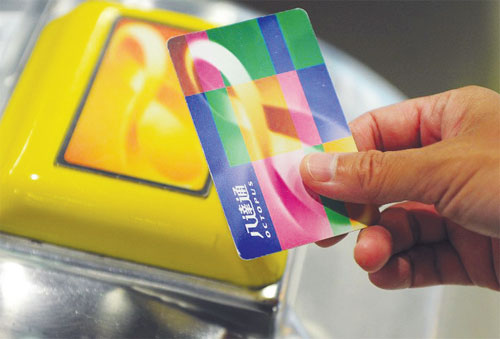Octopus offers to replace cards
Updated: 2015-08-06 08:49
By Kahon Chan in Hong Kong(HK Edition)
|
|||||||||
Users of first-generation smart cards to get free upgrade to use new system
Octopus is offering loyal users free replacement of first-generation smart cards - as the pioneer of cashless payment in the city faces greater competition after years of unrivaled domination in Hong Kong.
Hong Kong holds a special place in the history of cashless payments. It was one of the world's first cities to introduce contactless systems for small payments, particularly on public transport.
Octopus announced on Wednesday that holders of 1.96 million first-generation Octopus cards are eligible for new cards. It has issued 28 million smart cards since the Octopus system was launched in September 1997.
Commuters holding cards that bear no bracketed numbers can swap their old cards for free new cards at automated machines in 10 MTR stations. Remaining values, credit card top-up bundles, and access control identities will be transferred to the new cards.
But outstanding monthly passes for buses, ferries and parking lots loaded onto old cards will be lost.
Octopus' Chief Executive Officer Sunny Cheung Yiu-tong told a press conference that the scheme was voluntary - cards issued before 2003 will still work until further notice. However, the old cards cannot be detected by smartphones with near field communication (NFC).
The push for card replacements came about a week after PCCW's mobile telecommunications operator csl launched a new "Tap&Go" service. Users who have modified sim cards will be able to make payments with their NFC-empowered devices at retailers fitted with PayPass readers.
Octopus also entered the area of online payments with Taobao in February 2014. But unlike Alipay, users must tap real Octopus cards on NFC-enabled devices to pay online.
Internet Professionals Association President Witman Hung Wai-man said attempts by Octopus to break the boundaries of real card payments had been unsuccessful so far. He said the Octopus option for Taobao payment was simply too difficult and complex for most users.
Hung said that although Octopus was a pioneer enjoying market dominance, many of its functions could now be replaced by smartphones.
Hong Kong Association of Interactive Marketing Chairman Francis Fong Po-kiu noted that Alipay had flourished in the grey area of the mainland's regulatory framework. But operators in Hong Kong can do little until the regulator offers a new avenue for systems like Alipay.
Change is expected soon. The Legislative Council is now reading the Clearing and Settlement Systems (Amendment) Bill. The new regime, aimed to come into effect by end of year, would provide a comprehensive set of rules for retail payment systems and stored value facilities such as Alipay.
New players are set to enter the market. But both Hung and Fong were unconcerned about Octopus' prospects of surviving future competition. This is because 99 percent of the population uses Octopus, according to a 2014 survey.
|
An Octopus stored value card is displayed above a card scanner at the Mass Transit Railway (MTR). First-generation Octopus cards can be replaced with new ones that allow users to make online payments. AFP Photo / Mike Clarke |
(HK Edition 08/06/2015 page7)
